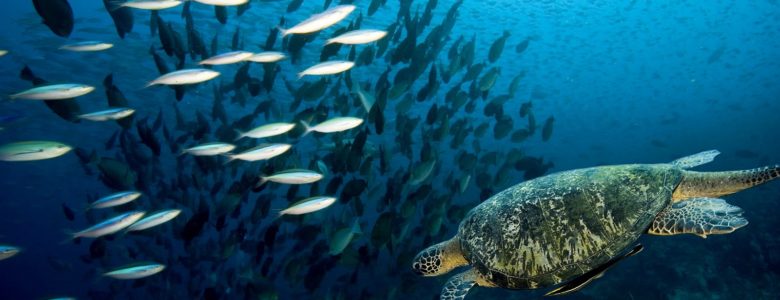
The environmental disaster that doesn’t make headlines
When we talk about environmental crises these days, we tend to emphasis global warming (aka ‘climate change’). Even if this is a vital topic, we shouldn’t lose sight on other environmental concerns — like the health of our planet’s seas.
Recently the EU organised the conference “Our Ocean” on this subject. Let’s have a look at the speakers: many prime ministers and presidents, EU commissioners, CEOs and bankers. The conference results included new commitments to save the oceans, several billions of Euro pledged, and more sea area to protect.
You might think these promises are on the right track, but the World Wildlife Fund (WWF), is much more concerned. Just before the conference, WWF published a report on the critical decline of the ecosystems of the Mediterranean Sea. Mass tourism, bad fishing practices and unregulated exploitation are creating an unsustainable future for the region.
WWF proposed concrete actions to address these problems; to balance and restore the Mediterranean environment. As did Greenpeace. Yet none of these proposals are being discussed, never mind acted on. All we have are commitments and pledges.
We should all be skeptical about EU conferences that don’t bring together all voices, that don’t promote dialogue with the civil society groups and scientists whose views must be considered in order to tackle our most pressing problems. As DiEMers, we support actions to create a sustainable and balanced environment. That’s why green technologies and environmental consciousness are top priorities of our economic and social policy platform. Let’s get behind it!
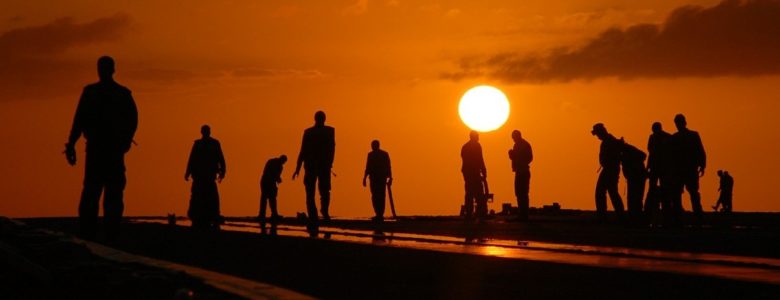
On eclipsed ends: ideals and ambitions in the search for Europa
People rarely talk about the overall objectives of the ‘European Project.’ Much of Europe’s political class acts as if it’s a non-issue. Since the rejection of the so-called ‘Constitutional Treaty’ in 2005 in particular, few major European politicians have been willing to talk about the future of the Union, almost to the point that one might infer that we’ve reached the optimal point of integration, where no more changes are required and we can hold the EU up as an example to the world, and tell everyone: ‘this is progress, this is where we all should be going.’
This is not a new phenomenon. Even in the 1990s, when Francis Fukuyama famously declared the ‘End of History’, the likes of Timothy Garton Ash were cautioning against further European integration, believing we had reached a point where ‘Liberal Order’ had been established and could prevail as the optimal example of government beyond the nation-state. A few minor problems were mentioned in passing: the need for American (primarily military-based) hegemony in Europe to maintain peace; the failure of the European states to prevent mass slaughter on the European continent in the Western Balkans; the necessity of national cultural homogeneity to guarantee stable democratic government (which the disintegration of Yugoslavia supposedly demonstrated); and the large-scale social dislocation caused by the implementation of neoliberal ‘shock therapy’ in Central and Eastern Europe.
Europe was not going to transcend the socioeconomic and political conditions of the 19th and early 20th Centuries, instead it was going to permanently embody them, through nationalism and national homogeneity, laissez-faire capitalism, unleashed on a global scale, imperialism against the weakened Central-Eastern & Balkan states and ultimately, international relations that weren’t significantly different to the ‘Concert of Europe’ established at the 1815 Vienna Congress. Europe wasn’t going to show us how to transform the world, it was going to alter it slightly to entrench a system that had been tried and failed not 100 years previously.
A United States of Europe?
One idea left out in the cold, abandoned by this brave new world in which history had ended, was the ‘United States of Europe.’ From such a term, it is clear its creators had not intended Garton Ash’s Liberal Order, when they had begun the European Project in 1951. They had envisaged much more. What the term really means has caused much confusion and debate among those who are willing to use it as shorthand for Europe’s ultimate ambition. What most agree on is that it involves federalism.
The most recent, open advocate of this idea is Guy Verhofstadt who argues that the EU’s major problems stem from its inability to act in the areas it needs to. The answer to this, he argues, is centralisation. It is clear that Verhofstadt sees the United States of Europe as an enlarged state encompassing all of Europe, but which is essentially no different to how nation-states act today. The European state would engage in the anarchic realpolitik of international relations as our nation-states have done until now, rallying the population to its chosen interests. It would promote massive corporations as its ‘champions’ in the economic sphere and it would intervene in the affairs of weaker countries. Europe would in effect become a nation-state.
This is unsurprising. The idea of a United States of Europe naturally looks to the American experience for inspiration, a state which has centralised over time, and which has used that power to project its influence across the world, to integrate the various European (and other) cultures which have arrived on its shores into a single hegemonic American culture, rather than allowing their diversity to proliferate. America is a nation, with all that this entails, including the attitude the idea of ‘nation-state’ engenders in the society that it governs. There is dissonance between this vision, however, and the vision of a Europe constructed on the basis of treaties. There’s also a dissonance between this and the idea that Europe in part embodied for centuries and still has the capacity to embody.
Treaties: the international paradigm
The key problem with building a Europe on the basis of treaties is that, being negotiated and signed by national governments, they hold neither the authority (granted by the citizens alone) nor the normative value (generated in the act of free citizens writing a constitution containing values and standards to which they will hold their government) required to underpin an entity whose purpose is to govern. Such an entity requires democratic authority to legitimately exist, and for citizens to be certain it governs in their name and by their consent. Such authority cannot originate from already established power for it has been given the authority only to govern according to norms and ideas laid out in a constitution, not to establish new forms of government. There are no checks on ministers and diplomats who sit around conference tables for hours on end to craft these treaties, they have no mandate on this matter, and citizens have no way of controlling the conduct of the negotiations. They can simply say yes or no to the final product (as we saw in 2005).
Were governments to engage in this, the ‘constitutional’ document that would emerge would fulfil a merely functional role – it would provide the rules and procedures of government alone. Like the treaties, its official status – a constitution not written by citizens – would be uncertain, and would not act as the official source of procedures and norms, which the government had formally adopted as the standards to which it would hold itself. Finally, without citizen-involvement in writing the document, there’s no guarantee that government would be at the service of the people, nor uphold its highest standards of democratic legitimacy. In other words, the law must be established democratically for it to be legitimate, and a constitutional document written by governments rather than citizens is not a democratic source of law.
Due to the insufficient nature of treaties as a foundation for democratic government, the United States of Europe is immediately beyond the scope of a ‘Europe of treaties’. We can assume that a ‘USE’ would be a sovereign state, if it was to achieve the purposes Verhofstadt and other federalists have set out for it. The sticking point is the matter of sovereign power, that is, authority to act on a matter to which all citizens are equally subject. In several areas, the EU does technically wield such power, as member-states are legally obliged to abide by its legislation. However, a USE would have to be completely sovereign – in any area, in accordance with the constitution, the federal government should be able to act. Treaties cannot legitimately provide this. A simple yes-no in a hastily-organised rubber-stamp referendum is not an example of the exercise of democratic authority – citizens themselves must write the constitutional document.
The result, by contrast, has been the ‘Europe of Nations-and-Offices’ we have today, a toxic mix of intergovernmental politics in which political authority is diluted, alongside highly centralised and integrated bureaucracy, enabling decisions taken in the centre to be smoothly implemented in the periphery. Crucially, this enables Europe’s politicians to take no responsibility for the decisions made at a European level; statesmen abdicate responsibility under the guise of being national representatives, while technocrats in Brussels with Europe-wide scope have no political authority. Corporate influence has easily taken advantage of this vacuum of politics, hence the proliferation of lobbyists in Brussels. Theirs are the only agendas that are consistently administered at the European level.
The rest of us are forced to engage in the Standortkonkurrenz of globalised capitalism, which renders nations and their citizens impotent, and accumulates power in private hands. This also ties in with the idea of ‘post-sovereignty’ being pushed by figures in Brussels like Jean-Claude Piris, who believe that in the postmodern world, old ideas of accountability, responsibility and authority to decide must be replaced with new ones geared towards globalisation. Reading between the lines, it’s clear by this they mean post-democracy. We don’t need accountable leaders anymore, or democratic controls, or clear lines of decision-making; in the globalised world, power is simply beyond the citizen’s control. Democratic sovereignty is neither national, nor European; it has been abolished.
A constitution: the transnational paradigm
It is clear that the aims of the idealists who conceived of the European Project have been eclipsed by more short-term and vainglorious ends. What was supposed to be a clear alternative to Europe’s violent, imperialist past, has come to represent the very forces which brought our Götterdämmerung in the period 1914-1945. Europa has the potential to mean so much more, to represent a new paradigm of government and society beyond the nations which we have circumscribed for ourselves: diversity, of opinion and of culture; transgression, of static and moribund establishments and status quos; sovereignty, achieved individually by acting collectively; and Utopia, acting in the name of an ideal world, in the knowledge that it is nowhere.
These things need to be refined and distilled in a constitution, written and adopted by the peoples of Europe. Such a constitution can only be achieved by accepting democracy, justice, liberty and solidarity as the basis of a transnational society that reaches across borders and makes us realise that we are not alone and isolated, and that to act as if this were so is to fundamentally weaken us all.
To realise these ideas in our lives, certain doctrines must be accepted as the basis of government. Republican democracy – the understanding that democracy enables us to seize control of our fate, and liberty in the first place is freedom from tyranny – and federalism – the priority of effective, decentralised self-government – must come together in the realisation of what Kant referred to as the pacific federation. It is what I call the civic-state, one that has at its heart universal values and civic, democratic emancipation, before ideas of culture, nation and ethnicity – without abolishing them. Its purpose is the reconciliation of Eros and Civilisation, humanity’s passion and its reason. This requires the recognition that the belonging and the particularity created by nations is a value, but one which democracy and just government must go beyond if they are to be realised.
This state does not demand unquestioning loyalty, but represents a true social contract, which we enter into with the aim of better achieving the universal values enumerated above. Hence, nations may leave freely, if they no longer believe they are able or willing to contribute to the common project, that is, if the purpose of the civic-state is lost. It is a contract between individual, nation and wider humanity. This project is one that is universal, but it must begin in Europe. We have an obligation by virtue of our current position and our history to be the vanguard of this new form of political community, one that is truly transnational.
The last century saw these ideas, which were first articulated here in Europe, grapple with our most primal urges. The European Project was begun to prevent the re-emergence of the worst of those urges; it will, only if it truly embraces the democratic, radical and just foundation of the civic-state. If its new ambition, like that which DiEM25 is working towards, is a Union of European Nations.
Sam Hufton is a student at King’s College London and member of DiEM25 since Feb 2016, involved in the London DSC. Alongside his studies, he writes a blog on European politics and history: Evropaïki Dimokratía.
This article originally appeared in Krytyka Polityczna.
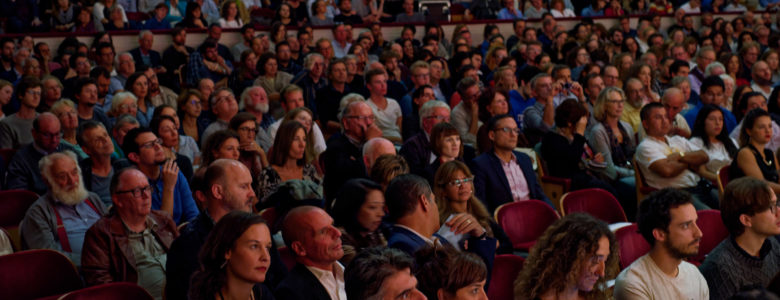
Highlights from our ‘Real State of the Union’ event
On September 9, 2017, in Brussels, we brought together 1,500 people and a set of star speakers (including former Ecuador President Rafael Correa) to put forward a real progressive alternative for the EU. As political scientist Pedro Moniz stated, we were able to gather more attention than Juncker’s State of the Union speech itself.
And in the run-up to the evening event, we held a workshop where DiEM25 activists from across Europe collaborated on how to take our movement’s work to the next level.
Here’s a video of highlights from the day.
And now we’re in the process of deciding our next move: the unfolding of an electoral wing to bring our progressive agenda to ballots everywhere in the Union!
Join us and help us move Europe forward! >>
Photo: (c) Neal McQueen
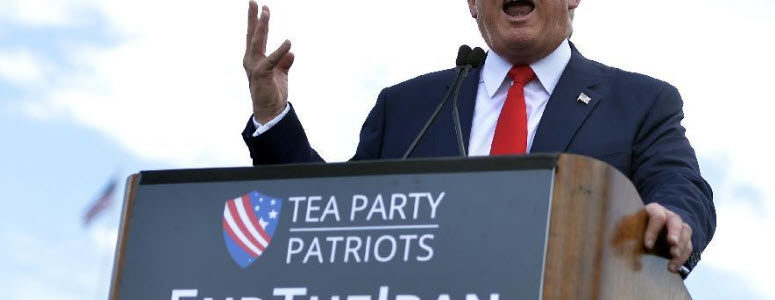
World under threat from “rogue” Trump
US President Donald Trump’s refusal to recertify the Iran Nuclear Deal effectively sets a bomb ticking beneath it. The deal was the product of years of diplomatic moves by the international community to prevent Iran from developing nuclear weapons after the International Atomic Energy Agency declared Iran to be in violation of its obligations concerning the enrichment of weapons-grade uranium.
The agreement, which was signed by the US during the Obama administration, was the product of painstaking diplomacy. According to the IAEA and all other signatories to the accord (Iran, Russia, China, the UK, France, Germany and the EU), Iran is in complete compliance and the deal continues: Iran continues to be incapable of producing nuclear weapons, and in return the world can trade with Iran.
Trump has always shown his disgust for the deal. It’s true it wasn’t a peace treaty; there were no provisions saying that all the parties to the treaty would have to be friends afterwards, and US-Iranian hostility has continued on both sides through Iran’s testing of ballistic missiles and the rhetoric of US politicians, while Israel and Saudi Arabia both actively encourage Trump’s anti-Iran position.
In this light, Trump’s refusal to recertify the deal, something which then gives Congress the power to impose sanctions and thereby destroy the agreement, is not a surprise. It can be added to the increasingly long list of deals that the US is destroying or threatening under this presidency: The Paris Climate Accord (where Trump already announced his intention to pull the USA out and kickstart the US coal industry), the Nuclear Non-Proliferation Treaty (where he indicated that he wanted to increase US stock of nuclear weapons ten-fold), the Trans-Pacific Partnership (taking the USA out of this agreement was one of Trump’s first actions as president), and no doubt many others.
This “rogue” behaviour should concern us all. The US is turning its back on dialogue and diplomacy. They increasingly show, through their president, that they are willing to take the world to war to impose their will and to destroy the planet to protect their toxic industries. Isolationism, arrogance, ignorance, intolerance, misogyny and xenophobia increasingly characterise this rogue president.
Today the world needs all members of the international community, more than ever before, to engage in dialogue as the only way to resolve conflict.
Tony Robinson, DSC Budapest 01, and member of the Abolition 2000 Coordination Committee
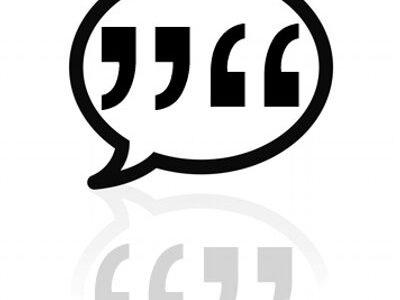
Euractiv just misrepresented Yanis’ position. Here’s how.
In an otherwise accurate report from Paris, Euractiv’s French correspondent mis-reported Yanis Varoufakis, DiEM25’s co-founder, as saying the following:
“Varoufakis plans to run for the 2019 European elections, even if he says the European Parliament “is not a real parliament.” But he wants to run in Germany, “to show that federalism is possible, and also that Germany’s current politics is harmful for Germans.”
This quotation is inaccurate (*). Varoufakis reiterated DiEM25’s intention to ensure that, in the 2019 European Parliament election, European voters are given an opportunity to vote for candidates, all over Europe, who have endorsed DiEM25’s European New Deal. Varoufakis also confirmed that DiEM25’s members are presently engaged in a debate on whether and how a transnational list of candidates, supporting DiEM25’s European New Deal, can be put together for the May 2019 European Parliament elections.
To explain the spirit and meaning of transnationality, Varoufakis offered as an example the possibility of, in the context of a single pan-European list, a Greek running in Germany, a German in Greece, an Italian in France etc. No announcement was made about any particular candidate in any particular country.
(*) Last week, Varoufakis gave many interviews to French media. He did not give an interview to Euractiv – perhaps this might explain their creative interpretation of Varoufakis’ words!
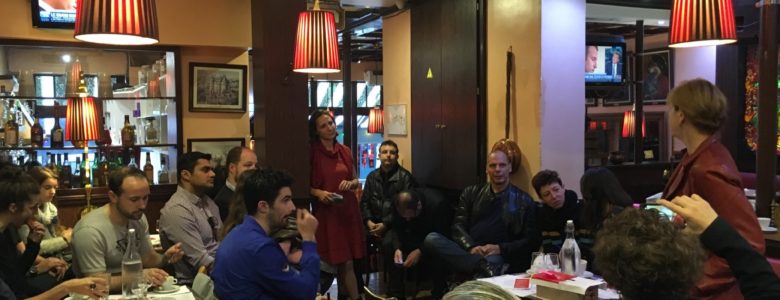
DiEM25 France ready to shake Europe!
Last weekend, DiEM25 France held a gathering in a Parisian café with Yanis Varoufakis. Here’s a quick report:
Old and new DiEMers, including representatives of our Provisional National Collective (PNC), got together with Yanis on Sunday. We discussed the movement’s social and economic policies, how these connect to the current French reality and political landscape, and exchanged ideas on how to forward our movement’s goals in light of the increasing political fragmentation.
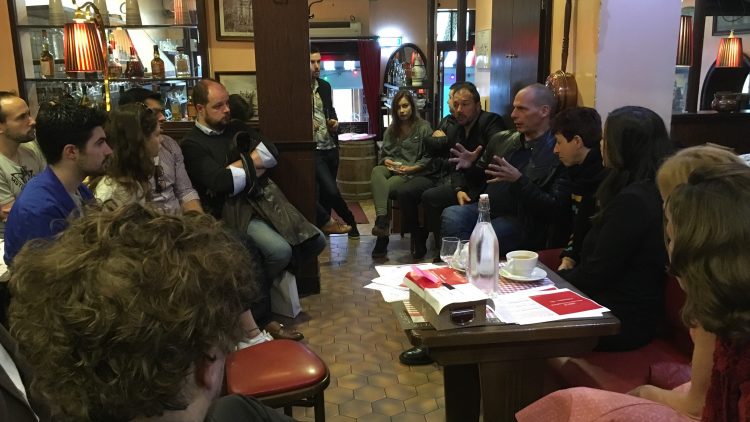
All those present agreed: We are determined to compromise as we gain ground in the emerging French political space – but our efforts shall never come at the expense of our principles. And this is important in the context of our current “electoral wing” process: we should seek to occupy institutional spaces for the sake of change, not power, nor empowering others to keep conducting ‘business as usual.’
In the months ahead, and in light of the ongoing DiEM25 debate about developing an electoral wing, DiEM25 France stands ready and eager to step up our pan-European effort to shake Europe.
Here is a short interview with Yanis right after our meeting:
Are you in France? Join us! We will soon announce follow-up gatherings here.

Austrian elections: untamed ghosts
A move to the right, further to the right, even to its extreme and a strong punch in the stomach for the aspirations of progressives. This sums up our reaction to yesterday’s Austrian election results. If anyone was thinking that the ghosts of nationalism, euro-scepticism and financial conservatism had been tamed, they should probably reconsider.
Before bewildering ourselves with terms like right-left, let’s recall the political legacy of the ÖVP-FPÖ (Austrian Peoples Party with Freedom Party of Austria) alliance, when they were leading the Austrian Nationalrat last time round, in 2000.
It is worth remembering that, then as now, when an ÖVP-SPÖ split in Parliament led to yesterday’s inevitable elections, this coalition came into being after a failure in negotiations with the socialists (SPÖ).
Then, as well as now, immigration policies played a crucial role in the political agenda. In 2000, after having granted political asylum to more than 90,000 Bosnians, fleeing from the bloody war at home, popular discontent went through the roof. This created the political vacuum and opportunity for the notorious FPÖ leader at that time, Jörg Haider, to push for a stricter and tighter immigration control.
In terms of the economy, “Mehr privat, weniger Staat” (More for the private sector, less for the state) was the mantra of those times. Any public stake in Austria’s commanding heights, such as Austria Tabak, VOEST or Telekom, had to be “liberalized”. As a result, by more or less obscure routes and to a greater or lesser extent, these companies became politically clientelist. And behind the scenes there began to form what was probably one of the biggest corruption scandals in Austrian post-war history: the Eurofighter affair. This was finally exposed and this year, the Austrian state managed to prosecute Airbus, and committed itself to replacing them by 2020.
When it comes to education policies, 2001 saw the introduction of a highly controversial tuition fee for universities, which was finally abolished in 2008.
All in all, Austria, as a mediator between West and East, between Central Europe and the Balkans, plays a very important role in mirroring emerging trends in Europe. Voter results should be a wake-up call for progressive movements, like DiEM25, to push harder and stronger for their positions.
Bogdan is a member of DSC Bucharest, but also a humble engineer living in Munich. His main points of interest are socio-political issues of South-East Europe, as well as promoting DiEM25 there.
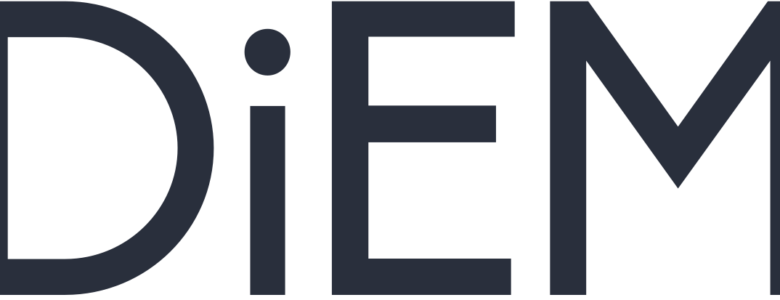
Why do we need an electoral wing?
Since we published our proposal to develop an ‘electoral wing’ for DiEM25 – a transnational electoral tool to help take our Progressive Agenda for Europe (PAE) to ballots across the EU – we have received a ton of feedback and questions from members and followers alike.
Below are answers to some of the most common ones.
[You can also watch Yanis’ recent Facebook Live video where he addressed many of these questions and more.]
- Is it really necessary for us to have an electoral expression?
Yes – we actually think it’s not even an option! The window for us to effect change is closing and we need to seize every opportunity available to us. This is especially important for our “European New Deal” economic agenda – our proposals to stabilise the Euro Zone and measures that can be implemented without treaty changes or new institutions.
So while our critique of party politics and the obsolete nature of current political formations remains valid, adding DiEM25’s proposals to the ballot should allow us to influence the system as well.
- Is it really so urgent?
Yes – this question has become even more pressing after the recent German election which killed off the last remaining hope for a federalist democratic push by Macron and Merkel. Time is running short. If DiEM25 is to make any impact on the 2019 pan-European (EP) elections; if DiEM25 really wants to act before Europe disintegrates (before 2025?); if we want to redress climate change or the dominance of xenophobia before it is too late, we must decide soon.
- Couldn’t we implement our policies by creating alliances with existing parties?
Creating alliances would be indeed much easier for us, but at the same time we don’t want to get trapped in the game of opportunistic alliances. We are open to creating alliances, but only if our allies fully embrace our policies (with possible adaptations to the peculiarities of the local situation, implementation timelines and technicalities, of course).
In fact, we are already working with like-minded political initiatives. For example, we are discussing the potential of an electoral partnership with two parties: Razem in Poland and The Alternative in Denmark. And we will continue to explore innovative forms of collaboration with political forces genuinely interested in pushing our Progressive Agenda.
But: many parties are deeply divided on what should be done with the euro, and the EU in broad terms. DiEM25’s principles are shared by segments within many different parties, but rarely by a party as a whole. Creating an alliance with these parties would often mean that we would have to leave some of our basic principles unproven outside the door. Doing this would reduce us all to yet another movement sacrificing its principles to gain electoral power – which we are not prepared to do!
- What other options do we have?
The European political landscape is vast and varied. We must be flexible and adaptable to take our agenda to the ballot box. So let’s be creative, but stick to our “not just another party” principle. Here are the options we are currently considering:
- We may choose to ask candidates to sign a charter committing them to DiEM25 policies (and hold them accountable to their word!)
- We may endorse candidates, parties or coalitions with a clear-cut political programme that is in line with our Progressive Agenda
- We may work for a progressive alliance whenever possible
- We may create a somewhat permanent partnership with a local party that would act as our ‘electoral wing’ in a given state, region or municipality (a movement that is setting out to attract parties, rather than the other way around, has a truly innovative twist to it, doesn’t it?)
- We may opt to launch a new party: a 100% DiEM25 political programme advanced by DiEMers in a certain locality, region, state…
or some option we haven’t yet imagined!
- You mean, we should create another political party?
Not exactly. DiEM25 should create an ‘electoral wing’ – a transnational political party that becomes part of DiEM25’s broader organisation.
As a first step, this would mean that DiEM25 seeks to register a political party, depending on national legislations, in various European (not just EU) countries. Where necessary to give these parties a more local identity, we may even agree on a name for country-specific DiEM25 party offshoots so they may be registered, crowd-sourced from the members, and after a pan-European internal DiEM25 vote that approves them.
This, of course, does not mean that DiEM25’s ‘electoral wing’ should contest elections in every country – in various countries. All options remain open. We may even choose not to participate in elections at all in certain places. We collectively decide if and how to participate at any given electoral contest.
And of course, DiEM25’s prime space of action remains the European at the transnational level, where all existing parties abysmally fail the test of relevance. (See point 11 below)
- Wouldn’t we risk losing our movement’s character?
It is becoming more and more clear that a movement without a party is impotent, and that a party without a movement can only repeat the failures of the past. We need both.
We won’t be able to achieve any of the things we wish to without an extra pair of strong hands (the electoral wing), implementing the ideas of the brain (the movement). Any potential DIEM25 parties shouldn’t replace the movement. A credible party should be backed by a passionately-run movement to which it is answerable.
Furthermore, DiEMers do not have to become members of the movement’s ‘electoral wing’ in any given country, whatever its form may be. Every DiEM25 member will continue to take part in shaping DiEM25 policies across Europe, and in specific countries, without necessarily joining electoral efforts if they do not wish to do so.
- Wouldn’t we risk losing our transnational character?
DiEM25’s ‘electoral wing’ could be the first transnational party with a genuine transnational decision-making structure and culture enshrined in pan-European campaigns and election manifestos for each country, and approved by all members across Europe. The electoral manifestos of each country-specific DiEM25 party could be proposed by its members based on a local adaptation of the general DiEM25 platform, but then these manifestos could be endorsed with a vote of all DiEM25 members across Europe.
If possible, DiEM25 will attempt to subvert nationality restrictions by fielding candidates from one country in elections in another country.
- How can we form and express an opinion about every single local issue?
Our members do not need to participate in every vote. But DiEM25 will always provide information regarding its positioning about the policies it takes to any given ballot.
- Are we politically ready? Is our agenda developed enough?
Yes, or better: we are ready to get ready! Our economic agenda, the European New Deal, is ready. We will speed up the preparation of the other policy papers (transparency, refugees and migration, labour, green investment, a European constitution and An Internet of People). Also, we will shortly establish thematic local groups (DSCs) to enrich our movement’s broader stance in areas like foreign relations, European defence, health care and education. This is yet another bottom-up move in our movement’s expansion and crowdsourcing of policy-making.
- Are we logistically ready? Do we have the necessary resources?
Well, we never asked that question back in February 2016 when we launched DiEM25. If we try to measure our capacity for success based on our current or potential future resources, then the answer will usually be: let’s go home and do nothing! In fact, the enormity of the challenges ahead and the issues we set out to tackle should be enough to discourage some. But we are doers. As Brian Eno so eloquently declared on the evening of DiEM25’s launch, “start cooking, the recipe will follow!“
- Which elections should we contest?
This question will always be decided by our members on a case-by-case basis. However, a great start would be for DiEM25 to aim for the 2019 European Parliament elections.
These elections offer us a chance to harness Europe’s only transnational democratic moment. While traditional parties remain visionless, trapped in the limits of national competition, DiEM25 can make the pan-European electoral process its platform for Europe’s first genuinely transnational campaign.
Obtaining some seats in the European Parliament would allow us to get the exposure and the legitimacy necessary to launch a radical process of change (a constituent assembly, for example) by 2025.
- And what if we, despite everything, choose not to go electoral?
Self-organising is hard and can be demoralising work, if there is no clear sign of focused impact and progress. The aim to bring our European New Deal policy framework to a ‘ballot box near you’ in the 2019 European elections, provides a marvellous focal point for sharing ideas, best practice, contrasting evidence, putting forward our hopes and fears, while testing our capacities for galvanising our efforts together – in short for transnational decision-making.
If we don’t manage to do this, DiEM25 could very quickly become just another group that meets up occasionally, has the occasional protest but doesn’t ultimately achieve anything of substance. We have much greater ambitions for DiEM25: to unleash its enormous potential, and change Europe!
Our electoral wing, if members greenlight it, would allow us to take our fight with the Establishment to the next level – a historic, first-of-its-kind pan-European political force that will return power to you. To the people. To us all.
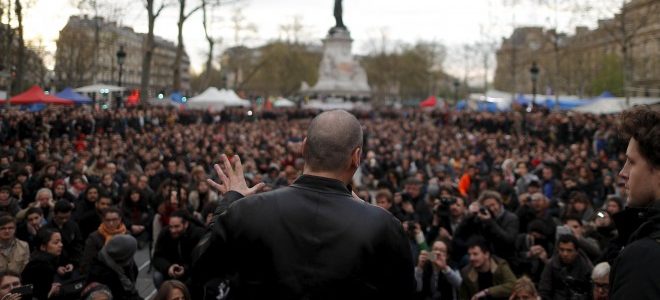
DiEM25 lands in Paris
After our wildly successful Italy tour, DiEM25 co-founder Yanis Varoufakis is now in Paris to spread our movement’s message and strengthen its machinery in France. Here’s what he will be doing:
- putting DiEM25’s proposals to key players in the French political landscape, to test the ground for potential allies
- meeting local DiEM25 activists, to expand our movement’s base in France (one of a handful of countries that already has a national coordination structure for all things DiEM25)
- launching the French edition of his book Adults In The Room, which details his confrontation with the EU establishment as Greece’s finance minister in 2015, laying the foundation for the movement that became DiEM25. (In case you missed it, there is also a film of ‘Adults’ in the works!)
Upcoming events in Paris this weekend:
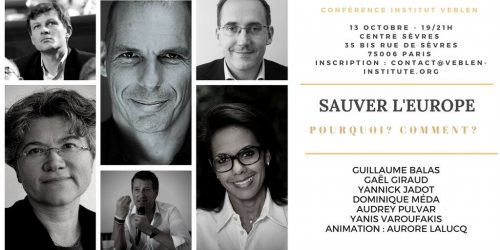
Friday, October 13 at 7pm.
Hosted by the Veblen Institute
At the Centre Sèvres, 35 bis rue de Sèvres, 75 006 Paris
Reservations: www.veblen-institute.org
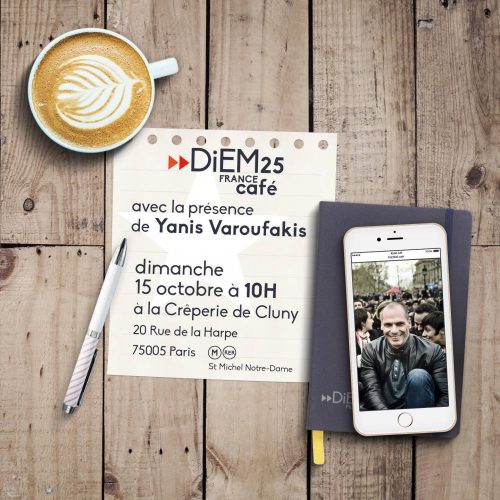
Register here.
We’ll be updating this page with media coverage from the tour. Stay tuned!
Press coverage:
Social Media:
Varoufakis : «Macron fait une énorme erreur en supprimant l’ISF» https://t.co/6JCOtHY5ly
— Le Parisien (@le_Parisien) October 12, 2017
#Europe "Nous sommes tous plus pauvres et nous avons moins d'espoir que ce que nous méritions" Yánis Varoufákis, économiste Grec pic.twitter.com/Z2T81rupRm
— franceinfo (@franceinfo) October 12, 2017
Yanis Varoufakis : "Dans l'UE, la démocratie n'a jamais existé" https://t.co/ekr1Vp8KId pic.twitter.com/7PjJqWKxlE
— Marianne (@MarianneleMag) October 12, 2017
“Aujourd’hui, la plupart des Européens ont perdu confiance dans les institutions de l’UE.” @yanisvaroufakis #28min pic.twitter.com/d0I4YxwOSg
— 28 minutes (@28minutes) October 12, 2017
Rencontre avec Yánis Varoufákis : «En Europe, les chiffres prospèrent, les gens désespèrent» https://t.co/MBsO8fAN56 pic.twitter.com/GbybDGVOEz
— Libération (@libe) October 12, 2017
TV:
– Arte, 28min, le 12 octobre à 18h
Radio:
– France inter, La matinale, L’invité de 8h20, Nicolas Demorand, le 12 octobre, à 8h20, réponse aux questions à 8h40
– France inter, le billet de Frédéric Beigbedder, le 12 octobre
– RTL, annonce de la rencontre de Benoît Hamon avec Yanis Varoufakis et mention du livre, le 11 octobre
– France info, Jean Leymarie, le 12 octobre, diffusion à 18h30
Articles:
– Mediapart, annonce de la rencontre le 14 octobre, le 5 octobre